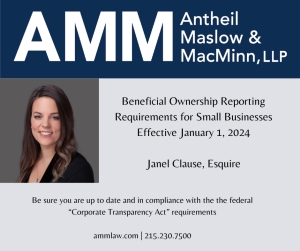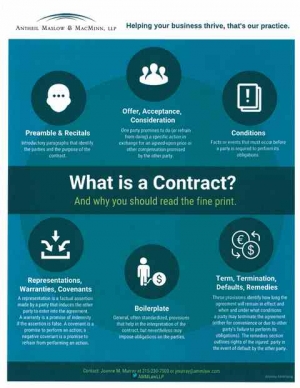As Promised: Beneficial Ownership Reporting Requirements Went Into Effect January 1, 2024
For the past couple years, we warned you in our business law blog that this time would come. It’s here; the federal Corporate Transparency Act (the “Act”), requiring many businesses to report beneficial ownership information about their owners and anyone with substantial control of the company, went into effect on January 1, 2024. This means that any “reporting company” in existence prior to January 1, 2024 has until January 1, 2025 to report; any reporting company that was formed on or after January 1, 2024 but before January 1, 2025 has 90 days after formation to report; and any reporting company formed on or after January 1, 2025 has 30 days after formation to report.
It should be noted that on March 1, 2024, the United States District Court for the Northern District of Alabama held that the Act was unconstitutional because Congress exceeded its authority. National Small Business United d/b/a the National Small Business Association, et al. v. Yellen, Case No. 5:22-cv-1448-LCB. The Financial Crimes Enforcement Network (FinCEN), the agency overseeing the administration of the Act, has announced that it will abide by the court’s order for as long as it remains in effect. This means that it will not seek enforcement against the plaintiffs in the case (Isaac Winkles, reporting companies of which Mr. Winkles is a beneficial owner or applicant, and members of the National Small Business Association as of March 1, 2024). It seems likely that this decision will be appealed. In the meantime, we encourage all entities formed after January 1, 2024 (other than those who were members of the National Small Business Association as of March 1, 2024) to comply with the Act given the 90-day compliance period. Entities already in existence on January 1, 2024 may want to await further developments given that their compliance deadline is months away.
What is a Contract: Preamble/ Recitals - Let’s begin at the beginning
This post continues my series aimed at explaining the main elements of a contract. These elements are outlined on the attached infographic. My goal is to define the key elements of a contract and to offer some tips and cautions to avoid costly mistakes as you approach these essential documents in your day-to-day business operations.
First up: the preamble and recital sections. The preamble of a contract is the introductory paragraph that identifies the parties to the agreement. It is typically followed by paragraphs known as recitals (also called the background section). Sometimes, these recital paragraphs are labeled “Whereas”. Taken together, the preamble and the recitals tell the who, what, when, and why of the transaction. In other words, they should tell the reader who the parties to the agreement are, the date of the agreement, and what the parties hope to accomplish by entering into the agreement.
As with stories told in other settings, inaccuracies and ambiguities in the preamble and recitals of a contract can cause problems down the road. One of the underlying purposes of a contract is to set forth the agreement of the parties so that their expectations can be enforced by a court or other tribunal. An accurate and detailed introduction to the contract can educate the person who is charged with resolving the dispute as to who the parties are, why they entered into the contract, and what their expectations were at the time the agreement was entered into.
One of the most common mistakes in these preliminary sections of a contract is to incorrectly name the owner of the business as a party, rather than using the entity name. This mistake results in the owner being personally obligated as a party to the contract, which is clearly not the result an owner expects after taking the trouble to incorporate.
While it may be tempting to gloss over these preliminaries without questioning their accuracy, I highly recommend taking the time to carefully review this section in every contract to be sure the story it tells is true and complete. It could prevent costly conflicts later.
Stay tuned for Part 2 of this series, which will move to the next element on the infographic: offer, acceptance, and consideration.
Do Delaware LLC Managers Have Fiduciary Duties? Maybe.
Just when minority owners of Delaware LLCs thought that the Delaware Limited Liability Company Act (the “Act”) protected them from overreaching managers, along comes the Delaware Supreme Court to say “better get it in writing.” It appears that practitioners longing for certainty will have to wait until the Delaware legislature steps in and revises the statute.
The Delaware Supreme Court recently published an opinion in a case involving a Delaware LLC (Gatz Properties, LLC) that was the manager of another LLC (Peconic Bay, LLC). Gatz Properties is managed and controlled by William Gatz, and the Gatz family and their affiliates owned controlling equity interests in Peconic Bay. They also owned real estate that was leased to Peconic Bay, which in turn subleased the property to a national golf course operator. The golf course proved to be unprofitable because it was poorly managed, and Mr. Katz anticipated that the sublease would be terminated. He decided to acquire the sublease and Peconic Bay’s other assets for himself. Consequently, he foiled the efforts of a third party to buy the sublease rights. He then engaged a valuation expert to appraise the property but did not provide the expert with information about the prior third party offers or tell the expert that the golf course’s unattractive financials were the result of its being mismanaged. Not surprisingly, the resulting appraisal showed that Peconic Bay had no net positive value. Next, Mr. Katz hired an auctioneer with no experience in the golf course industry to sell the golf course business. After lackluster advertising for the auction, Mr. Katz was the sole bidder and acquired the property for $50,000 plus the assumption of debt. Peconic Bay’s minority members brought suit in the Delaware Court of Chancery, alleging that Mr. Katz had breached his fiduciary duties to them. The Court of Chancery held that Gatz had breached both his contractual and statutory duties to the minority members, and Gatz appealed to the Delaware Supreme Court.
The Delaware Supreme Court agreed with the Court of Chancery that the LLC agreement’s clear language prohibited self-dealing without the consent of 2/3 of the minority owners, and Mr. Gatz testified on several occasions that he understood that Gatz Properties owned fiduciary duties to the minority members. The Court also upheld the lower court’s finding that Gatz breached this duty.
Moving on to whether Gatz breached a statutory duty under the Act, the Court noted that it was “improvident and unnecessary” for the Court of Chancery to decide that the Act imposed “default” fiduciary duties on managers where the LLC agreement is silent because, in the case at bar, the issue could be decided by interpreting the text of the LLC agreement. Additionally, no litigant asked that the lower court resolve the issue by interpreting the Act. Another concern for the Court was the lower court’s suggestion that its statutory interpretation should withstand scrutiny because practitioners rely on its rulings. The Court remarked that, as the highest court in Delaware, it was not bound to follow the lower court’s decisions. The Court rebuked the lower court for using the case at hand as a “platform to propagate [its] world views on issues not presented.” The Court concluded its reprimand by stating that because the issue of whether the Act imposes default fiduciary duties is one on which reasonable minds can differ, the matter should be left to the legislature to clarify.
Following the decision in Gatz Properties, equity holders in Delaware manager-managed LLCs would be prudent to clearly identify in the LLC agreement which fiduciary duties are intended to apply to their managers. Given the Court’s position that the issue is a matter for the legislature (not the courts) to decide, practitioners will be monitoring the activities of the legislature to see if it takes up the gauntlet.























